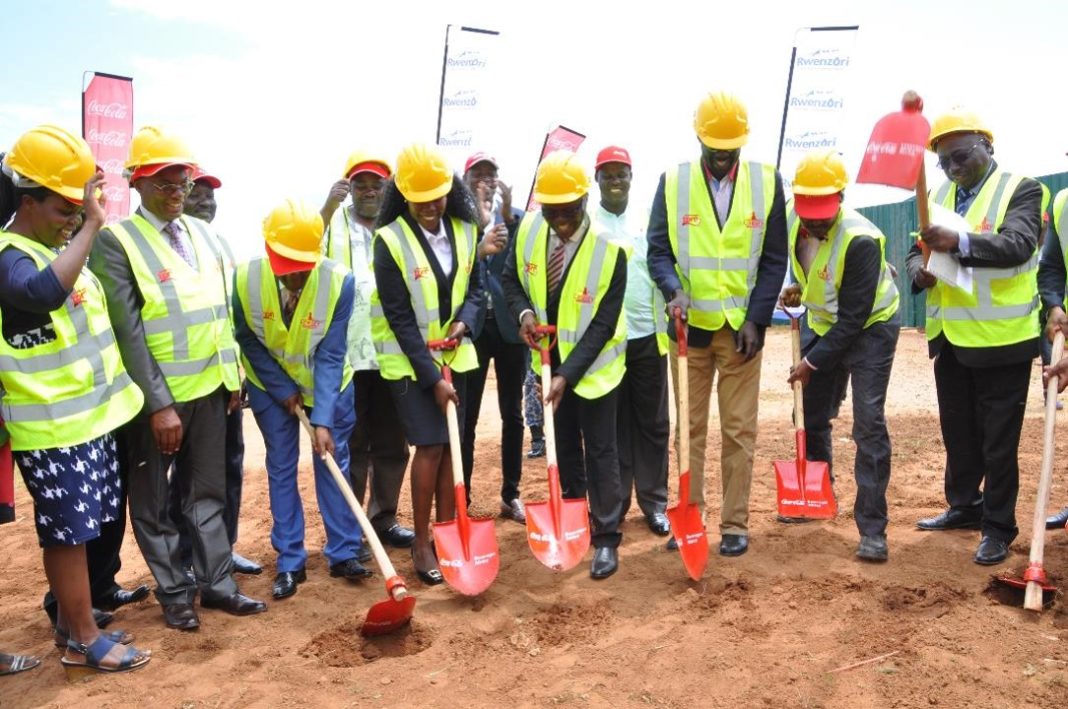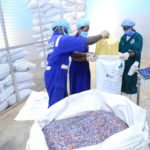Coca-Cola Beverages Africa (Uganda) has officially broken ground for a new Shs30.7 billion manufacturing line for mineral water.
The new bottling line at the Coca-Cola Beverages Africa (Uganda) Namanve site operated by Century Bottling Company will have a capacity of producing 24,000 bottles an hour, accelerating the production of natural mineral water.
The investment will bring to Uganda the newest bottling line technology out of Germany, enabling the company to innovate further for increasingly changing consumer demands.
The investment is part of a US$15 million investment plan Coca-Cola Beverages Africa has for Uganda alone in 2018.
Officiating at the ground-breaking ceremony, the Minister of State for Investment and Privatisation, Evelyn Anite lauded Coca-Cola Beverages Africa for focusing on Uganda and spending the bulk of the US$8.35million (Shs30.7billion) within Uganda to benefit citizens and support the economy.
“Of this, I am told US$3.5million will be spent inside Uganda on civil works and construction and auxiliary services. That is a very significant amount for many reasons. First of all, that means that the bulk of the investment that we are launching today is going to be spent inside our own country and will directly benefit Ugandans. That fits well within our Buy Uganda, Build Uganda policy and I applaud you for that. Also, your investment in a new Manufacturing Line creates more jobs for very many categories of Uganda ns – which fulfills the NRM pledge to create more jobs and wealth especially for the youth of Uganda,” Anite said.
“As Government, we acknowledge and thank Coca-Cola for being a development partner of Uganda. On top of these investments, you also pay taxes – I understand you paid Shs140billion in taxes last year. This is a highly significant amount and we look forward to seeing it increase once this new investment begins to bear results. During the tour of the facility, it was gratifying to see the quality of your equipment and to note that you have two other bottling facilities in Uganda, and that you are still setting up more. By bottling high quality international brands in Uganda you are promoting the economy within Uganda and also promoting the country internationally,” Anite added.
Acting Managing Director Martha Munnu Omer, assured guests of the investment commitments of Coca-Cola Beverages Africa (Uganda), which runs three subsidiaries bottling Coca-Cola products (Century Bottling Company), pure natural mineral water (Rwenzori Bottling Company) and recycling plastic waste taken from the environment (Plastic Recycling Industries).
“We employ about 1,800 Ugandans in our three plants in Kampala, Mukono and Mbarara, and support more than 90,000 businesses across our extensive retail distribution network. Coca-Cola Beverages Africa is proud to make these contributions on top of paying taxes to the tune of more than Shs140billion annually. We are serious about doing business in Uganda and supporting this economy,” Omer said.
She added that the investment in the brand new US$8.35 million Manufacturing Line was a strong demonstration of Coca-Cola Beverages Africa Uganda`s commitment to the development of Uganda despite the tough economic conditions.
“Because of this new Manufacturing Line, our 1,800 employees and hundreds of thousands of other Ugandans involved in selling our high quality products around the country will be assured of ongoing employment because production will increase. As well, the biggest bulk of this investment will be spent inside our own country and will directly benefit Ugandans.
This fits well within the ‘Buy Uganda, Build Uganda’ policy that government is advocating. The new investment will create more jobs for various categories of Ugandans – which fulfills the Government pledge to create more jobs and wealth especially for the youth. This includes employees during the construction as well as additional employees when the new line is completed. We are happy to be contributing to the development of Uganda,” she said.
CCBA management emphasized that the Company will continue to be a relevant partner with Government and called upon the officials to ensure they work to limit the challenges private sector faces in doing business.







